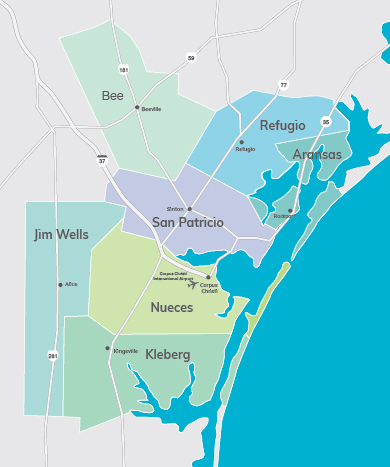Invest and Save in the Zone
Staying Competitive in a Global Market
Foreign-Trade Zones Overview
The Foreign-Trade Zone (FTZ) program is a fiscal tool that can defer or reduce duty payments, streamline supply chain costs, and improve a company’s competitive position in domestic and foreign markets. Foreign and domestic merchandise may be moved into zones for storage, exhibition, assembly, production, and processing without payment of duties, quota and other import restrictions until the decision is made to enter the goods into the U.S. market. This helps offset Customs advantages available to overseas producers who compete with domestic industry.
The FTZ program was created by the U.S. government to facilitate international trade and increase the global competitiveness of U.S.-based companies. The program, which has existed since the 1930s, continues to thrive and evolve to better meet the needs of American companies in the global economy.
Foreign-Trade Zones 101:
Our Service Area
A FTZ can be quickly designated anywhere in our seven-county service area.
In addition, all Port-operated laydown yards and warehouses along the Inner Harbor are part of the FTZ 122 magnet site and can be quickly and readily activated to meet storage needs.
Specific Advantages to FTZ 122
Location/Multimodal Transportation
According to the Texas Transportation Institute, the Corpus Christi area is one of the least congested major metropolitan areas in the United States. The Port of Corpus Christi lies along the Texas Gulf coast, 150 miles north of Mexico. The warm, dry climate of South Texas and the Port of Corpus Christi’s modern, multipurpose infrastructure support year-round operations, making it an ideal location for improved cost-effectiveness and greater productivity. In addition to excellent highway access to all major markets on uncongested U.S. Highway 181 and Interstate 37, the Port of Corpus Christi also offers dockside rail access by the Union Pacific Railroad, BNSF Railway and Canadian Pacific Kansas City. Three shipside tracks facilitate direct transfers between vessels and railcars. Covered tracks at the Dock 9 warehouse accommodate weather-sensitive cargo.
Channel Depth
The Corpus Christi Ship Channel Improvement Project is currently in its fourth and final phase with an estimated completion date of early 2025. This project is deepening the Corpus Christi Ship Channel from 47 feet to 54 feet – accommodating larger vessels, increasing shipping efficiency and enhancing navigation safety.
FTZ 122 and C-TPAT
In 2003, U.S. Customs and Border Protection notified Port of Corpus Christi of its official certification as a member of the Customs-Trade Partnership Against Terrorism (C-TPAT) program. The C-TPAT program facilitates partnerships between businesses and government to develop working relationships to protect global commerce against terrorism. The program provides the framework for trading communities to develop security policies and procedures. Once established, importers are given preferential processing by Customs. The C-TPAT program recognizes the added security that such practices bring to the internal supply chain’s final leg and considers the use of FTZs to be a “C-TPAT Supply Chain Security Best Practice.”
FTZ and Customs
The Port of Corpus Christi’s Foreign Trade Zone Manager, in conjunction with the Customs Port Director, hosts bi-monthly meetings with local FTZ operators and users to discuss problems, develop resolutions, provide updates and discuss FTZ issues. Special meetings are held for operators involved in importing and exporting when necessary.
What Activities Can Be Done in A Zone?
- Test
- Repair
- Process
- Manipulate
- Salvage
- Destroy
- Production*
- Assemble
- Repackage
- Relabel
- Display
- Store
How Can You Benefit From The Zone?

Defer Duties
Customs duties are paid only when and if merchandise is transferred into U.S. Customs territory and are not paid if the items are exported to a country outside the United States. This allows companies the ability to keep critical funds accessible for operating needs. There’s no limit on the length of time items can remain in the zone.
Eliminate Duties
Customs duties are eliminated on merchandise exported from the zone. No duties are paid on labor, overhead or profit attributed to production operations in the zone. Duty is not paid on in-bond, zone-to-zone transfer of goods and products. Generally, duties are also eliminated for material scrapped, destroyed or consumed in the zone.
Reduce Duties
With zone status, you may be allowed to pay lower duties on goods and products assembled or produced within the zone. If the duty rate on a finished product is lower than the rate on the components, you may choose to pay the lower rate.
Avoid Quotas
United States quota restrictions do not apply to items admitted to the zone, though quotas will apply when the items enter into U.S. Commerce. Restricted merchandise may be stored in the zone so that when a particular quota opens, the merchandise may be entered into U.S. Customs territory.
Eliminate Inventory/Ad Valorem Tax
Because goods in a zone are considered to be in international commerce – materials and merchandise imported from outside the United States and held in a zone, as well as those which are produced in the United States for export, are not subject to state and local inventory ad valorem taxes.

Eliminate Drawbacks
In some cases, duties previously paid on exported goods and products may be refunded through a process called drawback. The drawback law has become increasingly complex and expensive to administer and the need for drawbacks may be eliminated by using the zone.
Minimize Security Costs
Customs security requirements and federal criminal sanctions are deterrents against theft. This may result in lower insurance costs and fewer incidents of loss for cargo imported into a zone.

Simplify Inventory Controls and Record-Keeping
Many companies find their inventory control systems operate more efficiently in the zone, which increases their competitiveness. Zone users also find that meeting their governmental reporting responsibilities makes them eligible for special Customs procedures, such as direct delivery and weekly entry, which expedite product movement, facilitating just-in-time inventory procedures.
Contact FTZ Manager Danielle Converse
(361) 885-6187
Resources
Download FTZ informational flyer
Download the Application For Zone Sponsorship
Download the FTZ 122 Fee Schedule
Educational Videos by International Trade Administration
ITA YouTube page



